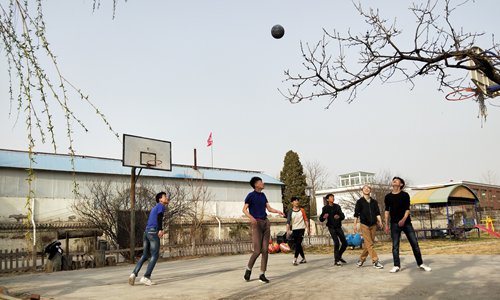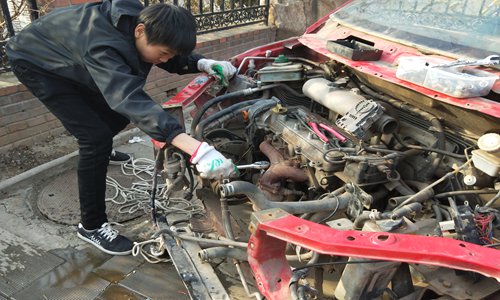
From the People’s Daily app.
This is Story in the Story.
In China, after a resident leaves the location where they are registered for six months, they become part of the migrant population. China's National Bureau of Statistics said the migrant population in 2017 reached 244 million, which means more than 18 percent of all Chinese are continually flowing from place to place.
As the United Nations International Children's Emergency Fund (UNICEF) wrote in its report in 2015, China's large-scale population migration has and continues to affect children who are traveling with their migrant parents.
The population of migrant students was 13.94 million in 2016, according to the Ministry of Education. About 80 percent of them chose to study at public schools in cities where their parents are working; others studied at private schools for migrant children.
A private school in Beijing called Kedou School provides an alternative for this marginalized population of students who may not have a chance to take the national exams. It provides students with vocational skills and creative courses such as critical thinking, baking, and lamp-blown glass crafting over a three-year period.
Today's Story in the Story will look at how the Kedou School provides an alternative form of education for children of migrant workers.

Students play basketball at Kedou School in Changping district, Beijing. (Photo: Courtesy of Ouyang Yanqin)
Ouyang Yanqin, the founder of Kedou School, told the Global Times that no matter what reasons a student has for not entering high school or taking the Gaokao college entrance exam, “they still have other options to enjoy a good life in this society.”
Many Chinese believe the Gaokao provides a platform that equalizes opportunities for students from all social classes, including those with limited educational resources, to compete together.

A student at Kedou dismantles an abandoned vehicle. (Photo: Courtesy of Ouyang Yanqin)
Ouyang herself used to be a migrant child in the city of Dongguan, South China's Guangdong Province, where her parents worked during the summer of 2001.
“On the first night we arrived, I encountered a temporary residential permit inspection,” she said.
Ouyang was one of the lucky few who received a higher education. She went on to become an investigative journalist at China's financial media group, Caixin Media. Hoping to help other migrant children, Ouyang resigned in 2015 and founded Kedou in Dongguan, where her parents have stayed for 10 years.
Focusing on science and technology education, Kedou provides 63 migrant children with courses in woodworking, cooking, and robotics.
Thinking about the core needs of migrant workers and their children, Ouyang became a teacher at a school for migrant workers' children in Beijing and tried to find an alternative for these students.
In the capital city, which boasts first-tier educational resources and the largest number of top universities in China, around 20 percent of migrant children cannot study at public schools due to their hukou restrictions, which means they cannot enjoy compulsory education for free in Beijing, according to Ouyang.
“Among them, 80,000 to 90,000 migrant children study at migrant worker schools that are mostly located in rural-urban outskirts. Because of this, many students choose to go back home at some stage,” she said.
However, upon returning to their hometowns, some students find that they are not familiar with the local culture or pace of classroom teaching and may lose confidence in a very short time, which can diminish their study habits.
Kedou School aims to help such students, especially those who wish to study hard but find it demanding, or who want to continue secondary education in Beijing and do not want to go back to their hometowns.
Oddly, the parents of these children are part of the problem. They hope their child can go to a university one day, but because they did not keep their children's names on the school roll in their hometowns to sign up for Gaokao, these children cannot take the exams.
In China, where a university degree matters most in the local job market, Kedou is conducting an experimental type of education to migrant students. Instead, the school teaches practical techniques and humanistic qualities to teenagers.
For the current 11 students in Beijing, they can choose courses out of their own interests, including traditional subjects such as reading, English, math, and physics, and more unusual classes like critical thinking, psychology, and even sex education.
“Some students cannot follow the pace of public schools, some don't like studying and some cannot take the Gaokao due to the hukou system,” Ouyang said. "No matter what the reason is, they still have other ways out.”
To achieve this, Kedou School teaches students vocational skills that are needed in creative industries such as crafts, photography, and design.
“I believe that, in my community, there will be more students like me who take part in contributing to the urban development and support their own community,” Ouyang said. “They are not the burden of our city.”
(Produced by Nancy Yan Xu, Raymond Mendoza and Lance Crayon. Music by: bensound.com. Text from Global Times.)


